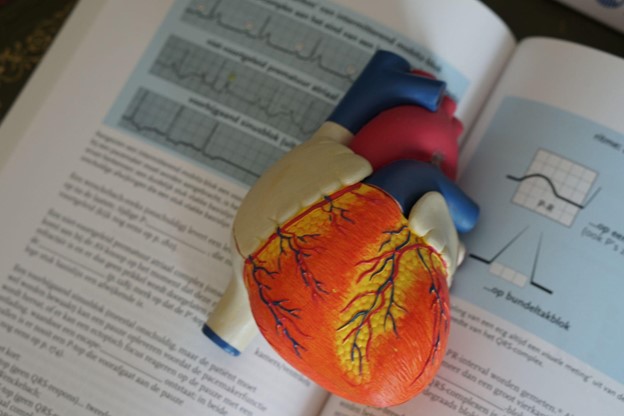
Atrial Natriuretic Peptide (ANP): Release, Functions, and More
The human body is always seeking homeostasis – balance. One major way that the body strives for balance is through blood pressure. The blood pressure spikes and slows for a variety of reasons, like stress, sleep, diet, and exercise. Atrial natriuretic peptide, or ANP, plays a key role in lowering blood pressure when it’s too high. This article provides an overview of how ANP is released and its functions within the body.
What is Atrial Natriuretic Peptide (ANP)?
Atrial natriuretic peptide (ANP) is a hormone that impacts the heart, also known as a cardiac hormone. It regulates blood pressure and sodium balance in an opposing system to that of the RAAS system. ANP is released when the body already has elevated blood pressure and blood volume and is responsible for bringing both back to normal levels.
ANP is a natriuretic peptide, along with BNP (brain natriuretic peptide) and CNP (cortex natriuretic peptide). These peptides are structurally related but have different roles, mainly related to cardiovascular homeostasis. Despite its name, BNP is released in the heart ventricles by cardiac muscle cells and has a similar effect to ANP. However, BNP is much less effective.
When the body is deficient in ANP, there are serious consequences. A deficiency can contribute to high blood pressure, cardiac hypertrophy, and even heart failure. Additionally, researchers have determined that ANP is involved in metabolic disease and lipid metabolism.
How Does the Body Use ANP?

To fully understand ANP, we must first discuss how the heart functions. The cardiovascular system pumps deoxygenated blood back to the heart. All of that blood enters the heart through the right atrium, which sits on the back side of the heart. When blood volume is high, so is blood pressure – these two factors are directly proportional because higher blood volume has more force, thus increasing blood pressure.
When we have high blood volume, there’s also more blood returning to the right atrium. This heavier load of blood entering the heart causes the walls of both the left and right atrium to stretch. When this stretching occurs, the right atrium naturally releases atrial B-type natriuretic peptide – ANP.
ANP’s primary function is to lower blood volume and blood pressure. It does this by heading to arteries in the body that can dilate and constrict, including arterials and muscular arteries. There, ANP binds to receptors that sit on the smooth muscle. ANP relaxes these muscles, which promotes vasodilation – expanding the diameter of the blood vessel to lower blood pressure.
ANP can also lower blood pressure by directly lowering blood volume. In this case, ANP promotes water elimination in the kidneys – in other words, eliminating water via urine. The kidneys have nephrons that are responsible for reabsorbing much of the water that filters through the kidneys for elimination. ANP actually prevents nephrons from doing their jobs, thus encouraging more water to be secreted and eventually eliminated in urine. By promoting the elimination of water, blood volume is also decreased, thus lowering blood pressure.
As ANP reduces blood volume, secondary effects can occur. This includes a reduction in extracellular fluid (ECF) volume, increased serum potassium, improved cardiac ejection fraction, and better organ perfusion.
Treatments Using Naturietic Peptides

When the heart can no longer pump blood normally, we experience heart failure. This could be due to a blockage that is causing blood to back up, leading to a build-up of fluid in the lungs and legs. Natriuretic peptides do help with protecting you against heart failure as they regulate blood pressure. However, when heart failure advances enough, these peptides cannot compensate.
With that said, scientists have developed pharmacological therapies based on the knowledge of the processing and signaling pathways of these peptides. Although results have been positive in clinical trials, they’re also shrouded in controversy. For example, Nesiritide, a synthetic BNP, offered significant relief in symptoms and improved hemodynamics. Unfortunately, there was also evidence that the use of this medication could cause a harmful impact on renal function.
In another case, researchers tested the use of compounds that contained the inhibitors of neprilysin (an enzyme that degrades natriuretic peptides) in relation to heart failure. Although the compounds showed benefits in morbidity and mortality, their use was also linked to more negative side effects.
From this, we can learn that simply raising the concentration of ANP and other natriuretic peptides doesn’t necessarily bring on the benefits of these peptides. More research is needed to determine how we can use ANP and our knowledge of how it works to protect people from heart failure and other serious conditions.
Be sure to work with your primary care physician before using this medication or schedule a consultation with one of our health consultants.
KIYA Longevity provides innovative best-in-class peptide products that meet the highest standards for safety and purity at a fraction of the cost.
FAQs: Understanding Atrial Natriuretic Peptide (ANP)
What is ANP and where does it come from?
ANP, also known as atrial natriuretic factor, is a potent peptide hormone secreted mainly by the cardiac atria (the heart’s upper chambers). It belongs to the natriuretic peptide system, which includes similar hormones like brain natriuretic peptide (BNP) and C-type natriuretic peptide (CNP).
How is ANP released?
The heart releases ANP primarily in response to increased stretching of the atrial walls. This stretching often results from conditions like high blood pressure or heart failure, making ANP a useful marker of these conditions.
What are the primary functions of ANP?
ANP acts on various organs and systems to promote fluid and electrolyte balance:
- Kidneys: ANP increases renal sodium excretion (natriuresis), leading to increased urine output and decreased blood volume.
- Blood Vessels: ANP relaxes blood vessels, helping lower blood pressure.
- Hormone Systems: ANP interacts with other hormone systems to fine-tune the body’s potent natriuretic response to cardiovascular stress.
How does ANP interact with receptors?
ANP exerts its effects by binding to specific receptors – think of them as cellular “locks.” The main one is the natriuretic peptide receptor A (NPRA). This binding triggers a cascade of events, including the production of cyclic guanosine monophosphate (cGMP), which plays a key role in ANP’s actions.
What is the clinical significance of ANP, BNP, and CNP?
Measuring levels of natriuretic peptides like ANP and BNP can aid in diagnosing and managing various heart conditions. For example:
- Heart Failure: Elevated ANP and BNP are common in both acute decompensated heart failure and chronic heart failure.
- Myocardial Infarction (Heart Attack): ANP and BNP levels may rise after a heart attack
PEPTIDE)BPC-157 PURE PEPTIDE (IMMEDIATE
RELEASE)BPC-157 PURE Oral Spray (RAPID
ABSORPTION)KPV PEPTIDE (RAPID ABSORPTION)TB4-FRAG MAX PEPTIDE (HEALING AND
RECOVERY)THYMOGEN ALPHA-1 (IMMUNE SUPPTORT)Weight Loss Peptide “Can’t Weight”
Questions about other peptides? Check out Kiya Longevity’s Peptide Guide.
Resources:
https://academic.oup.com/cardiovascres/article/68/1/8/288493
https://www.sciencedirect.com/topics/neuroscience/atrial-natriuretic-peptide
https://www.ncbi.nlm.nih.gov/pmc/articles/PMC1137012/
https://www.ncbi.nlm.nih.gov/books/NBK562257/
https://pubmed.ncbi.nlm.nih.gov/19089336/
